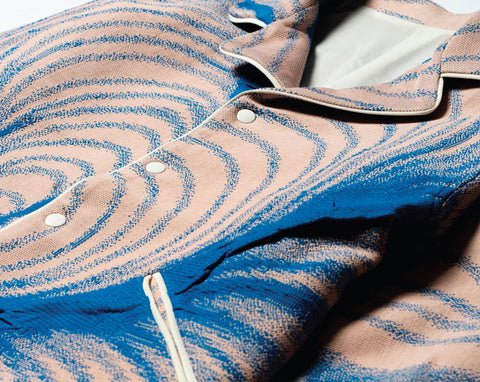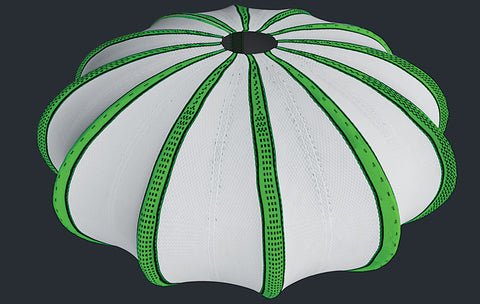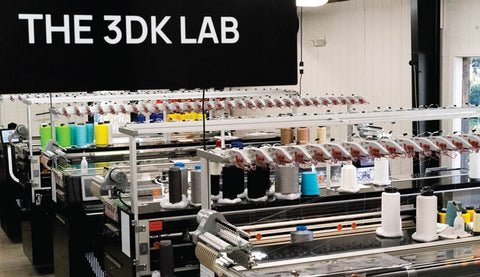3D sampling offers a sustainable solution to minimize lead times and waste in the apparel industry.

The unstoppable force of 3D digital sampling is revolutionizing the textile industry, paving the way for an exciting future. In this era of rapid change, businesses are faced with important decisions that can save resources and time and show their dedication to environmental responsibility in light of urgent climate concerns.
In general, 3D digital design offers a more efficient and environmentally-friendly approach to designing and prototyping clothing and textiles. It is crucial for the apparel industry to keep progressing. Incorporating 3D digital renderings into the design process can lead to significant improvements and help minimize material waste, resulting in impressive outcomes.
What Is 3D Digital Sampling?
Technological advancements and the widespread use of 3D models have greatly impacted the manufacturing and engineering industries over the years. These industries have successfully integrated 3D models into various products, including furniture, automobiles, computer chips, planes, and many others. Recently, the apparel industry has started embracing 3D technology as it discovers more and more advantages from its use.
In the world of fashion design and clothing production, samples are incredibly important in the development process. Nevertheless, the conventional approach to prototyping and sampling can be quite time-consuming and have negative impacts on the environment. Physical samples can be produced in a matter of weeks or even months, involving the use of materials and labor. On the other hand, digital samples significantly decrease the time it takes to get design approval, going from weeks to mere hours.
The 3D clothing sampling process efficiently digitizes, corrects, and plots the pattern, resulting in faster turnaround times compared to manual setups. Digital fashion is created and used without the need for water or chemicals. According to the United Nations Alliance for Sustainable Fashion, the production of a digital garment results in significantly less carbon dioxide emissions and eliminates issues like microplastic shedding and soil degradation, making it a more environmentally friendly option.
In the past five years, lead times for garment production have significantly decreased. However, traditional sampling methods have remained unchanged, resulting in a slower process and putting strain on teams. Additionally, it’s worth noting that 40 percent of sampling does not progress in production, highlighting the need for more efficient methods in the garment industry to reduce waste.
With the help of 3D software capabilities, designers can effortlessly bring their visions to life by creating virtual clothing that showcases a wide range of materials and textures. This advanced technology offers a remarkable level of realism, giving designers an accurate preview of how the final product will look. Designers have the opportunity to explore different fabrics and patterns, allowing them to test out various layouts and visualize how their designs will look on a model. This not only helps to minimize waste but also saves valuable time in the production process.
This review process is great for spotting any potential design flaws or issues with the fabric, like how it gracefully drapes on the body. Designers have the exciting opportunity to explore a wide range of color combinations by utilizing a Pantone color bank or a similar online shade bank in their 3D designs. It enables them to make precise decisions prior to producing the final physical product. By making these adjustments before producing garments, you can prevent costly mistakes.

The Benefits of Virtual Sampling Technology
Featuring real-time updates, virtual reality presentations, and drag-and-drop model creation, 3D sampling technology is leading the way in creating textiles more efficiently and with a focus on the environment. Textiles have a remarkable presence in our lives, making their way into various aspects such as automotive interiors, everyday clothing, and footwear. The latest advancements in 3D digital sampling software are revolutionizing the textile industry. These advancements are speeding up the prototyping process and making localized production possible. As a result, there is a significant reduction in waste and a decrease in carbon footprints.
The benefits of integrating virtual samples and digital twins into textile development are significant. With real-time updates, immersive virtual reality presentations, and intuitive drag-and-drop model creation, 3D sampling technology is leading the way in an efficient and environmentally conscious textile production approach.
Suppliers and vendors can now digitally review designs, even from a distance, which eliminates the need for global sample creation and shipping. This brings about greater convenience and efficiency in the process. Iterations for color, fabric, and shape adjustments can effortlessly occur online. This technology greatly simplifies content production, eliminating the need for teams to travel to different locations to photograph new collections.
In addition, the metaverse and augmented reality (AR) are transforming the way clothing items are accessed online, opening up exciting possibilities. This streamlines the decision-making process for buyers, empowering them to make well-informed choices without the need for physical representation. As a result, manufacturers have the opportunity to reduce excessive production and better match their output with consumer demand. This exciting combination of virtual sampling and cutting-edge technologies brings forth a fresh era of improved efficiency and elevated customer experience in the textile industry.
CAD/CAM software is revolutionizing the textile industry by enabling the design and production of innovative products and prototypes. VARIANT3D has proudly developed LOOP™, an innovative web-based platform that allows for the collaborative design of 3D knitted fabrics and products. It provides a highly realistic preview of the knitted fabric, giving designers and engineers a clear preproduction simulation before finalizing a sample. CLO is another 3D software company that specializes in fashion design. The company has developed an advanced garment visualization program that enables users to refine their ideas before moving forward with production. These emerging technologies contribute to a more efficient and sustainable production process.
Many times, garments may need some fine-tuning or alterations that call for a fresh version of the product to be crafted, stitched, and sent to the buyer. Virtual sampling efficiently addresses any required adjustments prior to garment production, resulting in reduced fabric, shipping, and fit-model expenses.
Embracing the Power of Digital Sampling to Minimize Waste
It’s fascinating to learn that the fashion industry ranks as the second-largest consumer of water globally! This is because a lot of clothes are made from cotton, which requires a significant amount of water to grow. According to a report by Morgan Stanley analysts in May 2022, the apparel industry has a significant impact on the environment. It consumes a large amount of fresh water, contributes to a substantial amount of global wastewater, and has a carbon intensity that surpasses both aviation and shipping combined.
A significant amount of clothing, around 85 percent, is unfortunately discarded in landfills every year. Additionally, a quarter of these discarded items are samples that rarely get the chance to be worn more than once or twice. According to the EPA, landfills receive a staggering 11.3 million tons of textile waste every year. Brands should explore alternative sampling methods to reduce the negative environmental effects of production.
Many brands currently using digital sampling are now asking for just one physical sample before launching production, or some have completely eliminated physical samples. This significantly decreases fabric waste and eliminates the unnecessary transportation of samples between the factory and designers, while also reducing time and costs. This is great news for both businesses and the environment.

What Can 3D Virtual Sampling Do for Businesses and the Environment?
Several factors are driving the shift away from using physical samples in favor of 3D samples. The recent supply chain disruptions served as a reminder of how unexpected challenges can arise, even when everything seems to be going smoothly. Additionally, brands need a fresh viewpoint due to the shift toward remote working.
In addition, the current turnaround time for creating and receiving physical fabric samples, especially when it comes to eliminating or changing designs, is highly inefficient. The fashion industry must be responsive when consumers are eager to make purchases. It’s much more efficient to minimize the time spent on spinning, programming, weaving/knitting, cutting, sewing, and shipping samples before production starts.
The visuals generated from the 3D simulations are also utilized to enhance marketing and e-commerce efforts. Marketing teams have the exciting opportunity to showcase all the different variations of a collection. Brands can now easily visualize a photo-realistic version of their product variations, which eliminates the need for costly and time-consuming photo shoots. Brands have the exciting opportunity to promote their products through their website or social media channels, allowing customers to make purchases even before the physical products are produced.
3D technology enables the creation of virtual samples for upcoming collections, which can be easily shared with buyers worldwide while significantly reducing the environmental impact. The fashion industry is embracing a more sustainable approach, considering materials, manufacturing, and recycling to reduce its environmental impact. What is the key feature in implementing all these processes? Embracing the power of technology.
The use of 3D software revolutionizes the design process and associated methodologies, enabling seamless and efficient communication among various departments and professionals. It’s great to see that digitally-driven whole-sale activities can now track and archive the interactions between brands and buyers. This is a positive development that will surely benefit both parties involved. The resulting data analytics and metrics offer valuable insights for creating personalized and cooperative digital collections.
The application of 3D technologies enables the optimization of digital made-to-measure and on-demand generation, shifting the production balance back onshore to locally-based microfactories. This change is absolutely crucial.
Many well-known brands, including Under Armour, Coach, Victoria’s Secret, Hugo Boss, Maggy London, Phillip Van Heusen, Nike, Abercrombie & Fitch, and more, have already embraced the use of 3D virtual sampling technologies. It’s exciting to see that many other brands are also expected to follow suit in the coming days.
The Power of Consumers
Consumers play a significant role in shaping the fashion industry. Currently, there is a strong push for a shift towards sustainable manufacturing, with a focus on ethical practices and transparency becoming the norm. Based on Heuritech Data, the social media hashtag #sustainablefashion has experienced a remarkable surge in popularity, increasing by 1,000 percent since 2018. The fashion industry is embracing a new standard, responding to customer needs and building trust.
Based on the Global Fashion Market Place sustainability report, a significant majority of brands recognize the importance of sustainable business development and innovation support. Implementing this transformation may be challenging and time-consuming, but fashion brands have come to understand that relying solely on marketing and vague statements is insufficient. Consumers are becoming more discerning and we will hold them accountable for any greenwashing attempts.
For consumers, the pandemic has fast-tracked their adoption of digital platforms, virtual reality, and augmented reality tools. Digitization will play a crucial role in shaping the future of fashion after the pandemic. This shift is happening, and brands should embrace the opportunities to digitize their sampling processes now to stay ahead of the game.
The fashion industry is in need of technologies that can help address the issue of poor fit, especially with the increasing number of returns and landfill waste. Recently, Google unveiled its latest breakthrough in artificial intelligence software. This innovative technology allows clothing images to be accurately represented on a diverse range of real models, showcasing how the fabric drapes, folds, clings, and stretches in different poses. In the fashion retail space, numerous fashion companies, such as Macy’s and luxury brands like Louis Vuitton and Dior, are enthusiastically exploring the potential of AR clothing try-on technology.
What’s the next step?
Embracing digital technology is a crucial step towards eliminating wasteful behaviors in the larger textile industry. With a growing awareness of environmental issues, many popular brands are embracing new technology to make significant improvements and move away from inefficient methods of the past.
3D sampling has the potential to revolutionize the industry in countless ways. It is empowering processes to become more efficient, thoughtful, and customer-focused, from design to production and marketing. When implemented correctly, it has the potential to bring positive changes to every aspect of the supply chain.
The rapid advancements in 3D technology are set to revolutionize the textile industry, shaping a bright future ahead.
By Garrett Gerson




